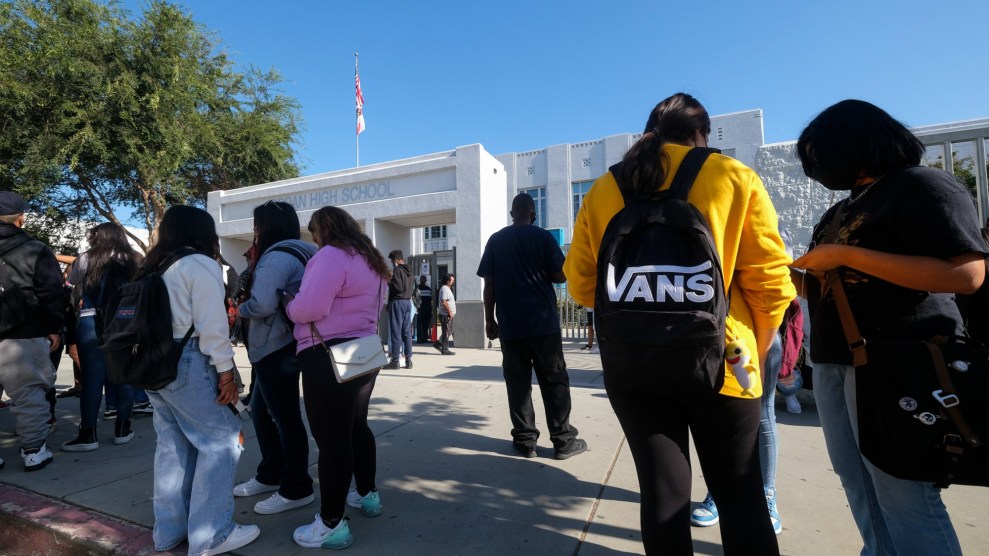
Students return to school at the Jordan High School in Los Angeles. Ringo Chiu/ZUMA
Ahead of the 2024 presidential election, Donald Trump and other Republican candidates are putting forward extreme immigration policy proposals that include ending birthright citizenship for US-born children of undocumented immigrants and conducting sweeping raids and mass deportation campaigns. During the GOP presidential debate in early December, former UN Ambassador and South Carolina Gov. Nikki Haley said, “all of the 7 or 8 million illegals that have come under Biden’s watch absolutely have to go back.”
That kind of rhetoric has a cost. The harm and lasting trauma resulting from policies that separate families—as well as immigration raids—has been well documented. But harsh immigration measures and anti-immigrant rhetoric that fuel a climate of fear for immigrants in the United States can have a far-reaching, and perhaps less visible, impact on other aspects of American life, including education.
That’s what a new policy brief by the UCLA Latino Policy & Politics Institute, Center for the Transformation of Schools, and Civil Rights Project/Proyecto Derechos Civiles, shows. Building on findings from the 2021 book Schools Under Siege: The Impact of Immigration Enforcement on Educational Equity, UCLA’s new report shines a light on how immigration enforcement hurts immigrant and Latino students and school communities more broadly. “The effects are negative across a range of outcomes,” says Lucrecia Santibañez, a professor at the UCLA School of Education & Information Studies and co-author of the policy brief. “They include academic performance, dropout rates, bullying, engagement.”
The brief released earlier this month cites a 2017-2018 survey of thousands of educators and school staff across the country. Sixty-one percent reported observing a negative impact on academic performance and 58 percent saw increased absenteeism as a result of heightened immigration enforcement. Almost half of respondents reported an increase in bullying of immigrant students, who were less likely to participate in after-school activities as a result of parents fearing they might be perceived as “different” or “other.”
“A lot of these respondents are talking about real life fears and trauma that these children are carrying for years because they don’t see the light at the end of the tunnel,” Santibañez says. “It’s a never-ending kind of loop. It’s really about not having them be in a state of mind where they can focus on school.” The negative repercussions, she explains, go beyond the individual students and their families. “If affects everybody in that school…When you impact one piece of that network, the whole system suffers.” The uncertainty affects teachers, for instance, who can experience second-hand trauma and anxiety over the responsibility of creating a safe environment for students.
The survey also found less parental engagement with the school among families who feared being targeted by US Immigration and Customs Enforcement (ICE) and deportation. “Many parents believed that because schools are public spaces funded by the government, they were especially vulnerable there,” the brief states. About half of surveyed educators and school staff observed a drop in parental involvement following immigration enforcement activities.
“When you think about kids who may be coming home to find that one of their parents is no longer living there, that they didn’t even get to say goodbye, or if you’re living in fear that your dad has to drive to work and he can get pulled over at any time and be deported,” Santibañez says, the constant fear and uncertainty that produces in children carries over to everything that’s happening in schools. She adds: “Unfortunately, because our immigration system continues to be so broken, all of these findings are still relevant today.”
Keeping the current immigration system in place, Santibañez argues, ultimately harms all kids and all communities. “If you care about schools and if you care about all children,” she says, “you should care about comprehensive immigration reform.”


















